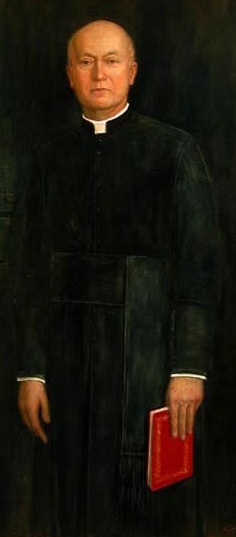
Father Stanley L. Jaki
(August 17, 1924 – April 7, 2009)
FROM THE PASTOR
by Fr. George W. Rutler
June 21, 2009
On this day of the Summer Solstice, I think of how much I enjoy the calendar published by the Vatican Observatory, with beautiful photographs of the planets taken with its telescopes at its headquarters on the grounds of the papal summer residence in Castel Gandolfo. Under the direct patronage of the pope, it is probably the oldest astronomical research institute in the world. Using it, Pope Benedict XVI’s predecessor Gregory XIII was able to promulgate the Gregorian calendar in 1582, a tremendous scientific achievement which we still use.
In this connection I am also reminded of a dear friend and great priest who died in Madrid in April, having just given a lecture on science and religion in Rome. Father Stanley Jaki was a member of the Pontifical Academy of Science. He was born in Hungary in 1924 and was trained as a Benedictine monk. Throughout his life he remained under obedience to the archabbot of Pannonhalma. Eventually he came to the United States and studied physics at Fordham with the Nobel laureate, Victor Hess, a pioneer in the study of cosmic rays. Father Jaki lectured throughout the world, and was Freemantle Lecturer at Oxford, Hoyt Fellow at Yale, and Gifford Lecturer at Edinburgh. For many years he lived in Princeton and was Distinguished Professor of Physics at Seton Hall. He received the Templeton Prize, which is the largest monetary award in the world, and used the prize money to help support his brother Benedictine monks. The theme of his more than fifty books was how the Catholic understanding of creation gave rise to modern physics and is the most substantial guide for the right use of theoretical physics and all physical sciences.
I am glad to say that we shared a common affinity for the writings of Newman and Chesterton. While he took no prisoners in academic debates, he had a splendid sense of humor, was an accomplished pianist, and particularly enjoyed the conversations of children. The rosary was a favorite devotion and he dutifully kept a daily Holy Hour which strengthened both his heart and brain (don’t think he made a distinction between them).
He often said, “Science lives by hope no less than religion.” His own priestly witness gave hope to many in his own day who might otherwise have lapsed into the “ennui” which is the moral infection of our present culture. Indeed, he knew with all great thinkers that there can be no culture without cult, which is worship. As Pope Benedict inaugurated the Year of Priests on the Feast of the Sacred Heart to help priests live priestly lives, we should also give thanks to the “Saviour of Science,” as Father Jaki called Our Lord, for priests who have already finished their earthly work.

No comments:
Post a Comment